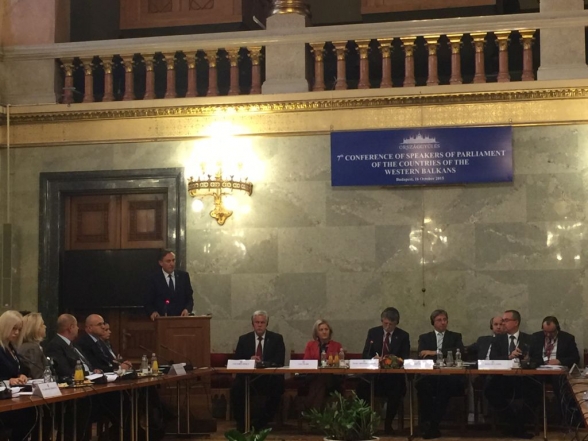President of the Parliament of Montenegro, Mr Ranko Krivokapić, at the meeting with Mr János Áder, President of Hungary, emphasied the gratitude to Hungary for the support to Euro-Atlantic integration. The interlocutors assessed bilateral relations between the two countries as excellent, and stressed the good economic cooperation.
"Hungary provides complete and selfless assistance to Montenegro as a proven friend and we treat this fact with special respect. For us it is very important that Hungary is Montenegro's contact country for NATO during crucial moments of our integration, when we expect an invitation for membership in December. I am confident that we will achieve mutual success - it will be a victory of progressive Montenegro, but also the diplomatic victory of Hungary", Mr Krivokapić pointed out.
During the conversation of Mr Krivokapić and Mr Áder, the President of Hungary commended Montenegro's progress and successfully implemented reforms. President Áder particularly emphasized as positive set of laws that were adopted, treating problems of corruption and the fight against crime, adding that a lot of measurable results were expected of Montenegrin institutions to happen atthis point. The two interlocutors jointly concluded during their conversation that states must show solid strength and determination in confronting the challenges that undermine the rule of law.
President of the Parliament, Mr Ranko Krivokapić, during the meeting with his Hungarian colleague, Mr László Kövér, Speaker of the Hungarian Parliament, assessed that relations between the two parliaments set example to others and epressed gratitude for their generous support and help to Montenegro on its Euro-Atlantic path, both in professional and political terms.
Both sides agreed that it was increasingly certain that Montenegro was expected to pass a big exam in December, and that Hungary regarded this as a common diplomatic and political success. Mr Krivokapić and Mr Kövér stated that our two countries had a special closeness that was further strengthened by sharing common value systems and commitment for stability and peace of the entire region of the Western Balkans.
During his official visit to Hungary, the President Krivokapić met with Mr Péter Szijjártó, Minister of Foreign Affairs of Hungary. On this occasion, the interlocutors concluded that the Hungarian-Montenegrin relations achieved great results, which meant not only the closeness of the two countries, but the contribution to the stability and progress of entire neighborhood.
"In all key processes for our country, since the restoration of independence, later during EU integration and now in the final stages of our NATO path, Hungary provided full support, and proved to be guardian and friend of Montenegro. Without Hungary, all of these processes would be more difficult and less certain. With December's invitation, the Mediterranean coast becomes entirely secure, from Portugal to Turkey. Montenegro is much bigger in its values than in numbers, and this is our contribution to NATO, to the region. We and Hungary have a common future in a system that is superior in values, thus superior in their defense", Mr Krivokapić pointed out.
Mr Krivokapić and Mr Szijjártó discussed the challenges of the migrant crisis, pointing out that Europe and the region must possess wise and responsible policy that goes significantly further than the mandatory sense. During the conversation, they pointed out to potentials that our country had in terms of investments, and Hungary showed willingness to invest in our agriculture and energy sectors.
During the VII Conference of Parliament Speakers of the Western Balkan Countries, there was a discussion on the security challenges facing our region, as well as the future of the EU neighborhood countries.
Addressing heads of Parliaments, President Krivokapić said among other things: "EU reports are now in the phase of comparative analysis of our progress. We need to help each other in areas where we are faster and better. Our region is facing the threat of populism. The economic crisis has brought back the populism to our region. The crisis leaves traces in all of our societies and introduces populism on the political scene, as the most dangerous policy that defocuses the public from the real issues and imposes topics that further turn attention from progress and problem solving."
Mr Krivokapić said that media freedom has increased, but that was not used for the strengthening of democracy. "There has been various entanglements into media structures, and they usually come from grey areas of society. Such media are becoming an instrument of political power, but which do not possess legitimacy. The power that no one suffers consequences for. Freedom of media is the foundation of democracy, but there is no balance between this uncontrolled power and professional liability. Parliamentary democracy has an obligation to act more crucially for the stability and the institution that will restore trust to citizens in democracy and politics. If we were late with reforms, corruption and organized crime had prospered. They are becoming a systemic problem. Addressing these issues and the power of states and parliaments will be a basic measure of the maturity of democracy."









